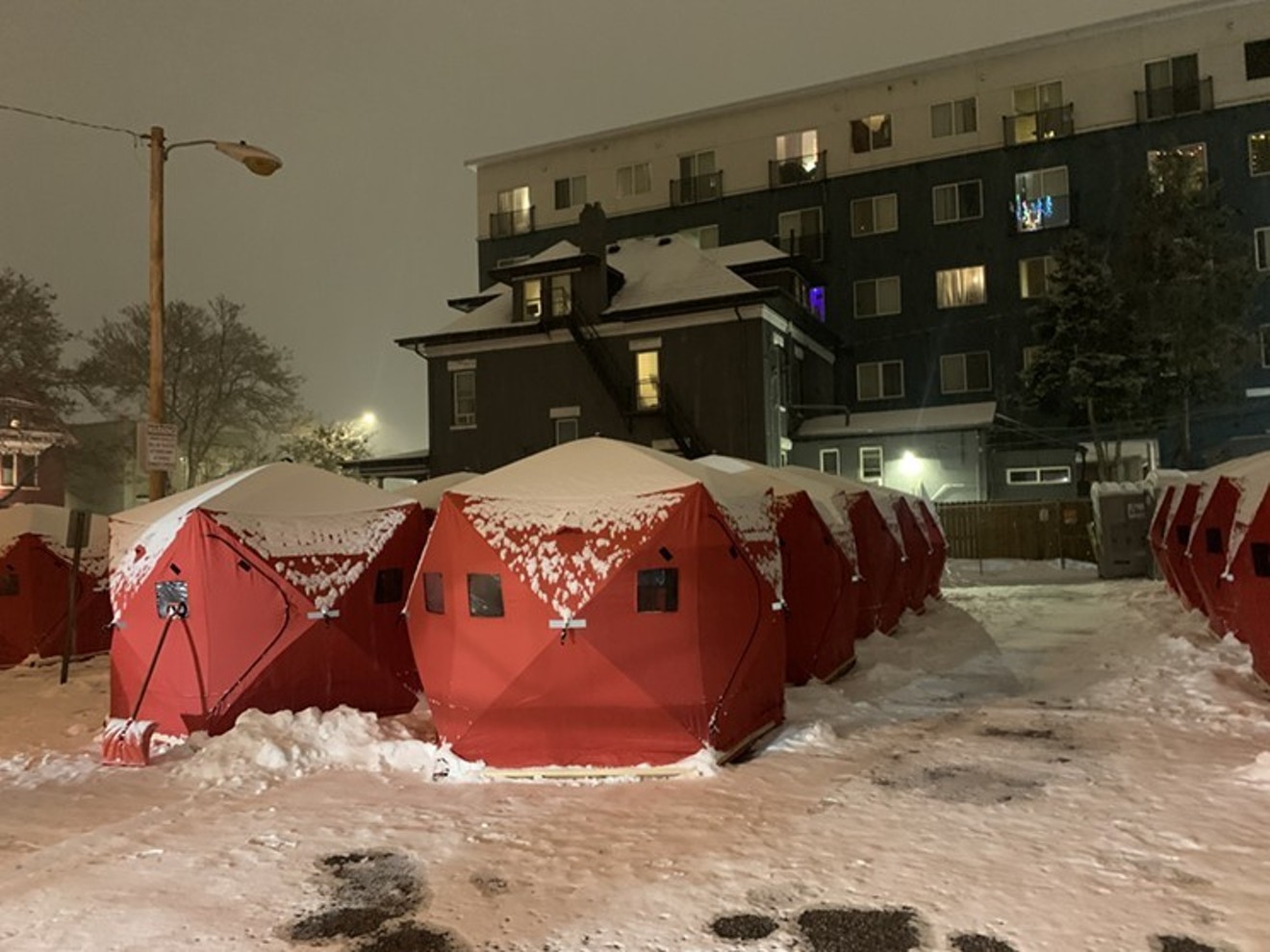Having secured a spot on the November ballot for a referendum to repeal changes made to the Denver Zoning Code related to group living, the advocacy group Safe and Sound Denver has now taken aim at safe-camping sites.
"We've heard a lot about Temporary Safe Outdoor Spaces lately. Here's what we haven't heard," Safe and Sound Denver wrote in the first installment of a three-part July 1 email campaign, which focused on the overdose death of a 34-year-old woman at a safe-camping site in late December.
"We have a question for the Mayor, City Council, SOS service providers, and media: Why haven't we heard about [this woman]? Where is the transparency and accountability in this big experiment?"
Westword had reported on the woman's death in a January 15 article on the safe-camping sites, before the medical examiner's investigation was complete. The autopsy report for the woman, who was living in one of the ice-fishing tents set up as part of an all-women safe-camping site next to the First Baptist Church in the 1300 block of Grant Street, indicates that she died of an accidental methamphetamine overdose.
In his June 30 announcement of the city's homelessness and housing strategy during Denver's pandemic recovery, Mayor Michael Hancock said that the city would be looking at expanding the safe-camping site program by adding more capacity across Denver.
And the city was quick to offer a response to the Safe and Sound Denver campaign. "We are always deeply sorry to learn of the death of anyone experiencing homelessness, as we and our partners work tirelessly to help people find shelter, stability and dignity each and every day. Safe Outdoor Spaces have proven to be successful, clean and healthy alternatives to the dangers of living on the street. They do not result in an increase in police calls for service. They do not lead to increased criminal activity in nearby areas. They are not dangerous, and, as their name implies, they are safe," says Sabrina Allie, a spokesperson for the Department of Housing Stability. "To portray Safe Outdoor Spaces, or this model of sheltering people in general, as unsafe is baseless and an attempt to exploit a tragedy for politics."
Kathleen Cronan, executive director of EarthLinks, the organization that ran the Capitol Hill site until its lease ran out in May, says that the woman's death was "a tragedy for her, her family, her friends and our entire community. EarthLinks followed all normal protocols in contacting emergency personnel upon finding her unresponsive. Just as we asked at the time of her death, we ask that the community allow her family to be allowed to grieve her passing in peace."
"Obviously, the reality is that there are more than 20 million people in the U.S. who have substance-use disorder and the vast majority of those people are housed. People die of substance-use disorder every day, in housing, in unsanctioned encampments. That is a very unfortunate part of our society," adds Cole Chandler, director of the Colorado Village Collaborative, which set up Denver's three other safe-camping sites. "To try to suggest that a safe outdoor space is not safe because of this one incident is inaccurate."
Substance use is forbidden at the safe-camping sites, Chandler notes, though staffers don't actively monitor what residents are doing in the privacy of their own tents.
Low-barrier and harm-reduction programs, such as those offered at the safe-camping sites currently located next to Park Hill United Methodist Church and on the campus of Regis University, don't require that those participating submit to drug tests or be involved in recovery groups. "Our approach is to serve people where they are and to offer people services," says Chandler.
Chandler doesn't appreciate Safe and Sound Denver's current approach to the safe-camping concept. "To me, it felt like fear-mongering," he says. "It felt like they were insinuating and trying to imply that there was causality. 'Because the safe outdoor space, this happened.' That is not true. I don't know that woman's story, but people have addictions, and our goal is to try our best to support those people."
Safe and Sound Denver emerged last summer as a citizen advocacy organization fighting the proposed group-living changes to the Denver Zoning Code, which would increase the number of adults that can live together in the same home and make it easier for service providers to set up halfway houses, sober living homes and homeless shelters across the city. After Denver City Council approved those changes in February, Safe and Sound Denver focused on successfully landing a referendum on the November 2 ballot that would repeal those zoning code changes.
Safe and Sound Denver did not respond to requests for an interview.
[
{
"name": "Air - MediumRectangle - Inline Content - Mobile Display Size",
"component": "12017618",
"insertPoint": "2",
"requiredCountToDisplay": "2"
},{
"name": "Editor Picks",
"component": "17242653",
"insertPoint": "4",
"requiredCountToDisplay": "1"
},{
"name": "Inline Links",
"component": "18838239",
"insertPoint": "8th",
"startingPoint": 8,
"requiredCountToDisplay": "7",
"maxInsertions": 25
},{
"name": "Air - MediumRectangle - Combo - Inline Content",
"component": "17261320",
"insertPoint": "8th",
"startingPoint": 8,
"requiredCountToDisplay": "7",
"maxInsertions": 25
},{
"name": "Inline Links",
"component": "18838239",
"insertPoint": "8th",
"startingPoint": 12,
"requiredCountToDisplay": "11",
"maxInsertions": 25
},{
"name": "Air - Leaderboard Tower - Combo - Inline Content",
"component": "17261321",
"insertPoint": "8th",
"startingPoint": 12,
"requiredCountToDisplay": "11",
"maxInsertions": 25
}
]












